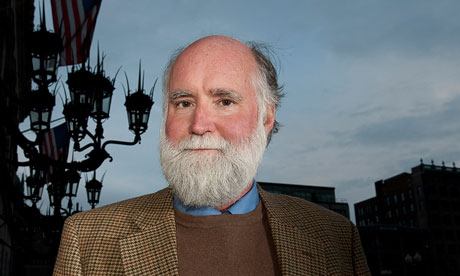Baker, Nicholson, Traveling Sprinkler, Blue Rider Press (Penguin Group), New York, 2013 (291 pp. $26.95)
Nicholson Baker is the anti-Mailer who knocks Mailer into the first row without throwing a punch, he’s that force-field mysterious. Everything about Baker—his perilous imagination; a style that hot-foots it across the burning coals of satire, seriousness and eye-winking humor; the vast, seemingly endless aesthetic knowledge in fields as diverse as poetry, lawn-watering technology and the history of electronic dance music, challenges the reader to tag-along and see what happens, never knowing quite why. Following behind Baker is like grasping the leash of a large, fevered bloodhound with its nose to the ground. One is dragged along while the dog lurches through a thousand scents.
Traveling Sprinkler might well be about the ubiquitous Sears best-selling lawn appliance, but it also might be about Paul Chowder, the minor poet who made his first sensational appearance in Baker’s widely-admired The Anthologist, in which he courted Roz, his erstwhile lost love, day-dreamed at length about the history and meaning of American poetry, drank a bit too much, and admired the courtly sensationalism of everyday life. In fact, everyday life seems to be what Chowder is all about, until we realize that his thought processes, like Baker’s, are hysterically recondite and strange. But so very compelling!
In Traveling Sprinkler, Chowder is at it again, dead-panning his way through such dead-serious concerns as the inner nature and aromatic heft of cigars (Cuban, Nicaraguan, Dominican), why both female poets and movie stars in general have such large, pliant mouths, how Debussy’s world was turned upside down by Stravinsky’s “Rite of Spring” (and of course, the metaphysical connection between Debussy’s “The Sunken Cathedral” for piano and his later preludes, written when Debussy was poverty-stricken and suffering from cancer), and a weave of other topics like movie soundtracks, Planet Fitness workouts, pop lyrics, garbanzo beans, and the history of Bassoons.
Sure, it’s the plot that matters, right? Paul Chowder minor poet frets about finishing his second book of poetry that he thinks he might call Misery Hat, a title not altogether appreciated by his agent. With the help of next-door neighbor Nan’s son, Chowder purchases enough mid-end tech equipment to create his own electronic dance music, which he envisions will somehow encode his love for Roz and push it to her through the ionosphere. About this I am guessing. Jealously raises its head when Roz is pursued, only half-heartedly it turns out, by Harris, a cold-hearted doctor she works with at the local NPR station in New Hampshire. The hay-loft of his barn collapses, plunging many boxes of books and manuscripts into the straw dust. Paul gets his beloved Kia fixed. Inspired by an admiration for the opposite of electronic dance music—namely, silence, Paul attends Quaker meetings, which are mostly silent, until some member or another chooses to speak. The mystery at the heart of silence serves as a counterpoint to electronic dance music, and in the equation that follows we are led to poetry itself, which seems to mediate our wish for intimacy with a substance that reveals nothing (that would be the Universe).
As you will surmise, Baker is a writer wearing many masks. Here he is at his most concrete, discussing the economic reality of actually being a poet:
“What it comes down to, for the working poet, is this. Either you can
go have the eggs Benedict at the place with the copper tables, and it’ll
cost you nine dollars, plus a big tip…or you can make a sandwich for
yourself, and wash an apple, and cut some carrots, and eat it in the car,
and it’ll cost maybe two dollars. You can eat five times as many meals
if you don’t go to the place with copper tables.”
Later, he’ll tell us, in two hilarious pages, the history of the traveling sprinkler, just as he’s explained to us the origin of the musical staff and the linguistic derivation of the word “note” in music—“The traveling sprinkler is a heavy metal slow-motion techno-dance-trance device with two white cast-iron toothed rear wheels that dig into the turf, and a sort of baton or helicopter blade on top that spins.” And so on, until Baker tells us what the really beautiful part of the traveling sprinkler is in fact. You’ll have to read the book to find out, though it has something to do with Bach’s tomato patch.
Fiddling with reality, worrying about money, trying to be in love, sympathizing with a neighbor whose mother has died, smoking cigars even though they are bad, being with his lover during a hospitalization, feeding the chickens, over-serving himself Yukon Jack on Saturday night, managing his moods—this is Paul Chowder.


